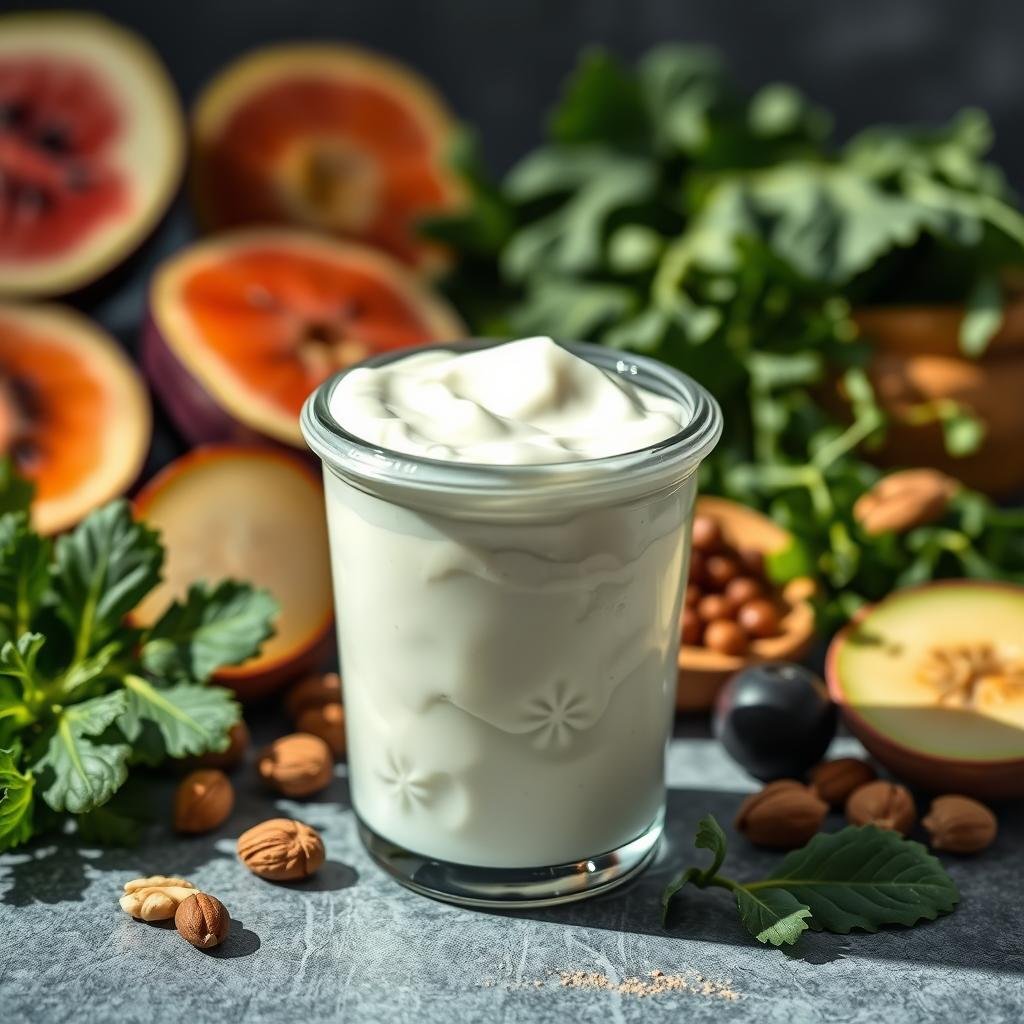Explain Why Yogurt with Live Active Cultures Helps Gut Health

Yogurt with live active cultures is key for a healthy gut. It’s full of probiotics, good bacteria that keep your gut balanced. This balance is vital for good digestion and absorbing nutrients.
Probiotic yogurt adds good bacteria like Lactobacillus bulgaricus and Streptococcus thermophilus. These live cultures boost your digestion and immune system. They also lower inflammation in your gut. Eating yogurt daily can bring many health perks.
The Role of Probiotics in Gut Health
Understanding What Are Probiotics? is key to knowing their gut health benefits. Probiotics are live microorganisms that help our health when we eat them. They keep our gut flora balanced, which is vital for good digestion and health.
Probiotic strains like Lactobacillus and Bifidobacterium are good for our gut. They protect our digestive tract and keep our stomach lining strong.
Probiotics are found in foods like yogurt and kefir. When asking What Are Probiotics?, remember not all yogurts are good. Look for “live and active cultures” on the label to find the right ones.
Probiotics are great for our stomach health. They can help with irritable bowel syndrome (IBS) and diarrhea from antibiotics. For more info, check out the health benefits of probiotics at the Cleveland Clinic. Good gut bacteria boost our immune system and energy.
Eating foods rich in probiotics, like yogurt, helps our digestion a lot. If you’re wondering What Are Probiotics?, adding them to your diet can make a big difference. They help balance our gut bacteria and fight off digestive problems.
How Yogurt with Live Active Cultures is Made
Making yogurt is a careful process. It starts with pasteurized milk and ends with a creamy, nutritious product. The key step is fermentation, where special bacteria are added to the milk.
The first step is pasteurizing the milk to kill off bad bacteria. Then, the milk is cooled and mixed with good bacteria. These bacteria, Lactobacillus bulgaricus and Streptococcus thermophilus, are vital for making yogurt.
Lactobacillus bulgaricus makes lactic acid, which thickens the milk and gives yogurt its tangy taste. Streptococcus thermophilus adds to the flavor and texture. This process takes 4 to 12 hours, depending on what you want your yogurt to be like.
The final product is a creamy yogurt full of live active cultures. These cultures are good for your gut, making yogurt both tasty and healthy.
Nutritional Content of Yogurt
Yogurt is packed with nutrients like proteins, vitamins, and minerals. These are key for staying healthy. Eating yogurt regularly helps repair muscles and keeps bones strong.
Yogurt is high in protein, making it great for muscle repair. Greek yogurt, in particular, is a good choice for more protein. It also has lots of calcium, which is good for bones and teeth.
Yogurt also has B vitamins, which help with energy and brain health. Its calcium keeps bones and muscles working well. This shows how important yogurt is for our health.
| Essential Nutrients | Benefits |
|---|---|
| Calcium | Supports bone health |
| Protein | Aids in muscle repair |
| B Vitamins | Boosts energy levels |
| Trace Minerals | Ensures overall body function |
Try different yogurts to get more nutrients. Whether it’s regular or Greek yogurt, each type has its own benefits. Eating yogurt regularly can make your diet healthier and more balanced.
Choosing the Right Yogurt for Gut Health
When picking yogurt for gut health, finding *live and active cultures* is key. These cultures are good bacteria that help your gut. Make sure the yogurt label says “contains live and active cultures.” This means it had at least 100 million living bacteria per gram at the time it was made.
It’s also important to avoid added sugars. Too much sugar can harm the good bacteria in yogurt. So, choose low-sugar yogurt or plain yogurt. Always check the nutrition label for added sugars.
Think about the fat content too. You might prefer low-fat or full-fat yogurt, depending on your diet. Both can have the same probiotic benefits if they have live and active cultures.
- Regular Yogurt: Often contains live and active cultures and comes in various fat contents.
- Greek Yogurt: Thicker in texture and higher in protein, typically with live cultures.
- Icelandic Yogurt (Skyr): A dense, high-protein option also rich in live cultures.
- French Yogurt: Mildly flavored and often includes live cultures.
- Australian Yogurt: Creamy and often contains live, active cultures.
- Lactose-Free Yogurt: Suitable for lactose-intolerant individuals, often with live cultures.
- Dairy-Free Yogurt: Made from plant-based milk, these yogurts can also contain live cultures if specified.
Yogurt often has good bacteria like Lactobacillus, Streptococcus, and Bifidobacterium. Kefir, a yogurt alternative, has up to 61 different microbes. It’s a great probiotic choice too.
For more info on finding probiotics-rich yogurt, check out this resource.
Benefits of Probiotic Yogurt for Digestion
Probiotic yogurt is great for your digestion. It helps with bloating, diarrhea, and constipation. This is because it keeps your gut healthy.
Adding probiotic yogurt to your meals can help with many gut issues. It’s good for those with lactose intolerance. It also helps kids avoid diarrhea after antibiotics.
A big study showed probiotic yogurt cuts down on diarrhea and bloating. It also helps with inflammation in the gut. This is thanks to special strains like Lactobacillus rhamnosus GR-1 and Lactobacillus reuteri RC-14.
The table below shows how probiotic yogurt helps with different gut problems:
| Condition | Effect of Probiotic Yogurt |
|---|---|
| Antibiotic-associated diarrhea (AAD) | Significant reduction in incidence |
| Chronic constipation | Improvement in stool consistency and frequency |
| Inflammatory bowel disease (IBD) | Reduction in inflammation and symptom severity |
| General digestive health | Support of nutrient absorption and healthy gut microbiome |
Probiotic yogurt is key for a healthy diet. It helps your digestion a lot. For more info, check out the study here.
Impact on Immune System Function

The gut microbiota is key for a healthy immune system. Yogurt with live cultures is a great source of beneficial bacteria. It can increase gut bacteria by up to 10,000-fold. Eating such yogurt regularly can make your gut healthier and support your immune system.
Studies show that yogurt’s probiotics reduce inflammation. This is good because inflammation can cause many health problems. Yogurt’s probiotics help treat and prevent stomach issues, making your immune system stronger.
Yogurt changes your gut microbiome and metabolome. The metabolome shows how well your body uses nutrients. These changes help your immune system get stronger, thanks to better energy use from Short-Chain Fatty Acids (SCFAs).
The role of microbes in immunityis important for yogurt’s effect on your immune system. Probiotic bacteria in yogurt can change how your body uses SCFAs. This can greatly improve your immune health.
Yogurt with Live Active Cultures for Weight Management
Yogurt with live active cultures, like Greek yogurt, helps manage weight. It has lots of protein, which makes you feel full. This can help you eat fewer calories.
- Enhances satiety due to high protein content
- Supports healthy digestion with probiotics
- Provides essential nutrients like calcium and vitamins
Yogurt helps balance gut health, which boosts your metabolism. So, yogurt is more than just a food. It’s a key part of managing your weight.
| Yogurt Type | Protein Content (g per serving) | Calories (per serving) | Probiotic Strains |
|---|---|---|---|
| Greek Yogurt | 10-15 | 100-150 | 3-5 |
| Regular Yogurt | 5-9 | 150-200 | 2-4 |
Adding yogurt to your diet helps with weight control. It also boosts your health by giving you important nutrients. Plus, it keeps your gut healthy.
Yogurt’s Effect on Heart Health

Yogurt is good for your heart. It’s important to know how full fat and low fat yogurt affect your heart. This helps you make better food choices.
Yogurt can help your heart by keeping your blood lipids healthy. Eating yogurt can lower your cholesterol. This is good for your heart.
Yogurt also helps keep your blood pressure down. This is great for people with high blood pressure.
Full fat yogurt has more saturated fats. This used to be seen as bad for your heart. But now, some studies say it might not be as bad as thought. It could even be good for your heart.
Low fat yogurt is better for your heart. It has less saturated fat but keeps the good stuff like probiotics. This can help your heart stay healthy.
| Yogurt Type | Benefits | Considerations |
|---|---|---|
| Full Fat Yogurt | Rich in flavor, contains beneficial fatty acids | Higher in saturated fat |
| Low Fat Yogurt | Lower in saturated fat, supports cholesterol management | May contain added sugars |
In conclusion, both full fat and low fat yogurt are good for your heart. Choose based on your health goals and what you like to eat.
Managing Gastrointestinal Disorders with Yogurt
Yogurt with live active cultures is good for your gut. It has probiotics, like Lactobacillus acidophilus, that help your gut health. They balance the good and bad bacteria in your gut.
Probiotics, like Lactobacillus acidophilus, are very helpful. They can help with IBS symptoms and stop diarrhea from antibiotics. They make digestion better and help your body fight off sickness.
Many studies show that yogurt’s probiotics are good for your stomach. If you have IBS, eating yogurt can make you feel better. The National Center for Complementary and Integrative Health agrees. They say probiotics can stop diarrhea and help with IBS.
Yogurt with active cultures can help with stomach problems like IBS and diarrhea. Eating it every day can make your gut healthier. This can really help if you have these issues.
Daily Recommended Intake of Live Culture Yogurt

Knowing the right daily yogurt intake is key to getting live culture yogurt’s benefits. Most people should eat one to two servings a day. This helps keep your gut healthy with enough probiotics.
These live culture yogurt recommendations focus on probiotics for digestion and health. Pick yogurts with live active cultures for the best results. Look for brands like Chobani, Fage, and Stonyfield.
Here’s a quick look at yogurt serving sizes from different brands:
| Brand | Type | Serving Size | Probiotic Content |
|---|---|---|---|
| Chobani | Greek | 6 oz | 7 live cultures |
| Fage | Greek | 7 oz | 5 live cultures |
| Stonyfield | Organic | 5.3 oz | 6 live cultures |
In short, following live culture yogurt recommendations is vital. Eating one to two servings daily boosts your gut health. This improves your overall health and well-being.
Plant-Based Alternatives with Live Active Cultures
For those who avoid dairy, there are tasty and healthy alternatives. Fortified soy-based options are very close to dairy yogurt in nutrition. They are great for those looking for plant-based yogurt with live active cultures. Other plant-based yogurts like almond, coconut, and oat also have probiotics. They help keep your gut healthy.
Knowing the nutritional facts of plant-based yogurts is helpful. Here’s a comparison of their nutritional profiles:
| Yogurt Type | Protein (g) | Calcium (%DV) | Probiotics |
|---|---|---|---|
| Soy Yogurt | 6 | 20 | Yes |
| Almond Yogurt | 1 | 10 | Yes |
| Coconut Yogurt | 0 | 15 | Yes |
| Oat Yogurt | 2 | 20 | Yes |
Adding fortified soy-based options and other plant-based yogurts to your diet is good for your gut. They offer a tasty and nutritious way to enjoy live active cultures.
Scientific Research Supporting Probiotic-Rich Yogurt
Studies on gut health show that probiotic-rich yogurt boosts the gut microbiome. This improves overall health. It helps the immune system and can manage IBS and heart disease.
| Research Study | Key Findings |
|---|---|
| Harvard T.H. Chan School of Public Health (2017) | Probiotic-rich yogurt may improve digestive health and bolster the immune system. |
| Journal of Gastroenterology (2018) | Evidence supports that yogurt with live cultures aids in managing IBS symptoms. |
| American Heart Association (2019) | Regular yogurt intake is linked to improved heart health due to its probiotic content. |
| Clinical Reviews in Food Science (2020) | Documented benefits include enhanced gut microbiota and overall health improvements. |
These studies highlight the value of probiotic-rich yogurt in our diet. It offers many health benefits. Ongoing research shows how probiotics improve digestive and immune health.
Common Misconceptions About Yogurt with Probiotics
Many people think all yogurts are the same. But, not all yogurts have live active cultures. These cultures are key for gut health. It’s important to read labels to know which yogurts are good for you.
Some think flavored yogurts are bad because of sugar. But, many brands now use natural sweeteners. This makes flavored yogurts a good choice without too much sugar. Reading labels helps you pick the right yogurt.
There’s a myth that you need a lot of probiotic yogurt to get benefits. But, even a little can help. The trick is to pick the right yogurt and eat it regularly. Knowing the truth about probiotic yogurt helps you get the most health benefits.





